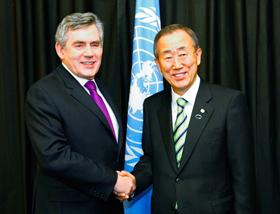
This September, five and six year olds in the western world have enjoyed their first day at school. In the developing world, however, a total of 61 million school-age girls and boys around the world will not go to primary school at all.
While if you visited the classrooms of New York, London or Paris you would find happy young children beginning their educational journey, if you visit the mining regions of Mali, West Africa, you'll find children as young as 10 working in tunnels 30 meters underground. Visit the cocoa growing areas of neighboring Côte d'Ivoire and you'll see young boys of primary school age working with machetes.
This tragic picture of child labor repeats itself across the developing world: new figures show that 91 million girls and boys are currently engaged in child labor. On current trends, there will be as many as 170 million child laborers in 2020, who, instead of acquiring the basic literacy and numeracy skills that we in the western world often take for granted, are engaged in grueling and often dangerous work.
In Africa alone, the number of children aged between five and 14 involved in child labor is projected to increase by some 19 million. Growing numbers of children forced into the workplace, and so denied the opportunity to prosper in the classroom. This endless cycle of poverty begetting poverty through lack of opportunity is ready to repeat itself if nothing is done.
Contrast this with the western world, where education has taken its rightful place amongst the priorities of government, with centuries of investment in teaching and infrastructure. In ten years' time, 800 million of the world's citizens, primarily in wealthy countries, are set to have university degrees.
More than ever our educational qualifications will determine what each of us earns and owns. As low-skilled jobs become computerized and the value of memory, computation and manual dexterity falls, those who have years of education behind them will be at the front of the line in the jobs market.
Indeed, the education gap is now increasingly recognized as the root of economic disparity. For centuries the world's most brilliant minds have tried to understand why some countries are rich and others poor; why, for example, Americans are 39 times richer than the Nepalese and 140 times richer than the people of the Democratic Republic of Congo. Attention has focused on whether it is geography, culture, technology capital or poor institutions that spurs us on or holds us back.
This month's Nobel Symposium in Stockholm on Growth and Development emphasized an often-overlooked rationale for a nation's economic prospects: the power of education. As Nobel Prize winner Robert Lucas demonstrated, the wealth of nations will increasingly come not just from their highly educated individuals but from sophisticated interactive learning communities. From now on, no nation can aspire to become a high income country without education.
Yet just at the point that the world is acknowledging that the creativity and skill of human beings is the key to the future, we have decided to invest less. Out-of-school numbers have stalled as educational aid from rich countries starts to fall, from the already paltry figure of $13.50 per child per year in Africa.
The time for action is now, if we are not to betray the promise we made in the second Millenium Development Goal, of universal primary education. This week, the UN Secretary-General Ban Ki-moon launched his Education First initiative. We will be calling on governments, NGOs, businesses and foundations to rally behind the cause of putting children into school. The business community has already begun to mobilize, with the newly formed Global Business Coalition for Education uniting multinational corporations from across the globe in their commitment to use their resources and expertise.
We will expose the scandal of lost education through child labor; we will show how unacceptable it is that each year ten million girls become child brides instead of going to school; and how it is hypocrisy to say we are a compassionate world when, in 2012, an untold number of children will be forcibly conscripted into armed groups, used by criminal gangs to perform illicit activities or sold into prostitution.
Education across the world must therefore be a priority for us all -- an economic and of course a moral necessity. The challenge is not insurmountable; we know how to build schools and how to train teachers. And so the time for excuses is over, and action must begin today.
Gordon Brown is the UN Special Envoy for Global Education. Visit www.educationenvoy.org to find out more and to watch a video about the challenge of getting the world's children into school.
